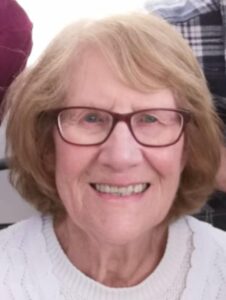- Friday, July 11, 2025
- Stay Connected
 Abraham Lincoln
If given the truth, the people can be depended upon to meet any national crisis...
Abraham Lincoln
If given the truth, the people can be depended upon to meet any national crisis...
 Guildford news...
for Guildford people, brought to you by Guildford reporters - Guildford's own news service
Guildford news...
for Guildford people, brought to you by Guildford reporters - Guildford's own news service
Voices of History: A Child’s Experience of WWII Evacuation
Published on: 9 Feb, 2025
Updated on: 9 Feb, 2025

Joy Chuter recalls life as an evacuee during the Second World War
Through Time article by Stella Kuchanny
For many, the Second World War is a collection of textbook dates, black-and-white photos, and distant stories. Yet for children like Joy Chuter (née Bacon), it was a lived reality—filled with fear, resilience, and the heartache of separation.
Joy, alongside her two younger sisters, Olive and Sylvia, was evacuated twice during the war. Her detailed recollection provides a poignant window into the life of a wartime evacuee. The first evacuation began on 1st September 1939, when Joy, aged 12, and her sisters were sent from St Michaels School in Southfields, London, to the Surrey countryside.
“We were picked in groups of three or four. Being at the end of the line, my sisters and I had to wait,” says Joy, who lives in Guildford. Initially placed temporarily with a housekeeper named Miss Webb, they soon settled into a routine of bedtime stories and chocolates. Despite the kind gestures, the experience brought both order and a deep sense of displacement.
As air raids intensified in October 1940, the children faced a second, far more harrowing evacuation. Joy described the chaos at Clapham Junction, where children queued in silence as double-decker buses ferried them to London stations. The children were then ushered onto trains, the sound of air raid sirens echoing behind them.
“Our train seemed endless. We stood in silence, no one moved until the teacher told us to. It was very quiet and subdued.”
Joy and her sisters arrived in Cheltenham and were transported to Northleach, where a village hall became their temporary home. It was during this chaotic journey that Joy lost track of Olive. Her desperate calls for her sister went unanswered, and the family would remain separated for 18 months.
“We were told she would definitely follow,” Joy wrote. “But morning came, and still no Olive.”
While Joy and Sylvia found temporary refuge in Gloucestershire, Olive was sent to Oxfordshire. Their younger brothers were taken to Guildford. Meanwhile, their father remained in London, working for the fire brigade.
For Joy, the host families offered mixed experiences. “We seemed to be in trouble for the least thing,” she reflected of one placement in a remote farm cottage. The isolation—walking miles to school, hitching rides on a milk float—added to their hardship. Eventually, their parents retrieved them, reuniting part of the family in Guildford.
Amidst these challenging circumstances, the story highlights not just the resilience of the evacuees but also the sacrifices of their parents. “It must have been very sad for Mum, when we were separated,” Joy said.
Joy’s memories remind us of the immense emotional weight borne by children during wartime. In answering the question, “What was it like to be an evacuee?”, Joy’s words resonate:
“Being an evacuee meant leaving your home, family, and everything familiar. It meant hiding your feelings of homesickness, trying to fit in with strangers. You had to grow up.”
Her story is one of survival, courage, and family bonds—told through the lived experience of a child caught in history’s upheaval.













John Lomas
February 9, 2025 at 4:32 pm
In 1939, at the time of the 1939 registration, my parents to be (I was born in ’42) had two brothers as refugees in Byrefield Road. Last time I looked the ’39 register it was still showing one of them as redacted so he was either still living or only recently deceased.
Jane Hepburn
February 9, 2025 at 9:34 pm
Very moving article from Stella Kuchanny. I thank her for bringing Joy’s experiences to light. We rarely hear these stories and that generation, as she said, had to grow up quickly. I for one would love to hear more accounts like this. It is a vital part of our history and must not be forgotten.
Jules Cranwell
February 11, 2025 at 2:21 pm
My mother was evacuated, aged 11 from Clerkenwell, London to the countryside. She lasted a week, and hitchhiked home, after being told she could have a bath, but only after the farmer, his wife, his three sons had had theirs, in the same bath water!
She went on to join the land army in 1944, in the Hertsfordshire countryside, where she met my father, then in the RAF.
She had much happier memories on the land army than as an evacuee.